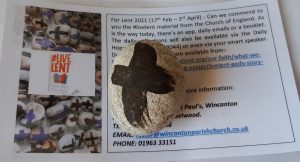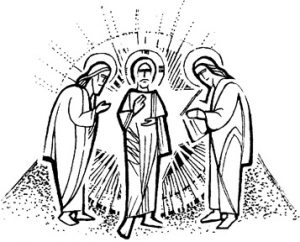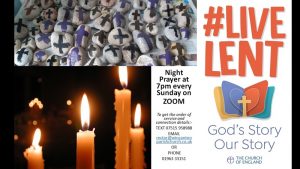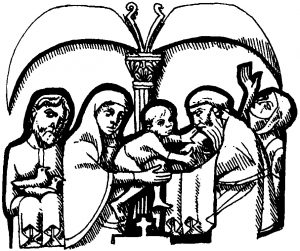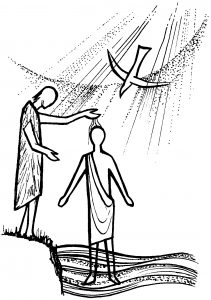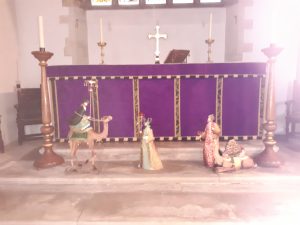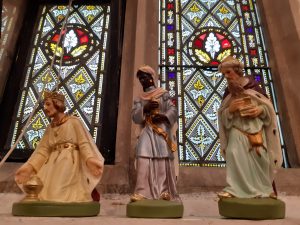Link to Video service for Lent 1 https://www.youtube.com/watch?v=vg9iM3Dv_Z8
Link to the reflection for the Diocese:
Genesis 9:8-17, Mark 1:9-15
In the name of the living God, God the Father, God the Son and God the Holy Spirit, Amen
 The account in Mark’s gospel of Jesus’ forty days in the wilderness is very brief. Jesus walks on his own 2 feet into the wilderness under his own steam (the gospel acknowledges he was driven by the Spirit), where Jesus then remained for 40 days to prepare for what was coming next. We get references to tempting by Satan, being with the wild animals and the angels waiting on him – but in Mark that is it! What Jesus did was take time out, time to make the transition from the every day life he had had up to this point, to being ready to share his important message with others. The foot steps he would have to take and the foot steps only he could take in his time on this earth. He was isolated with his thoughts and concerns in an inhospitable place
The account in Mark’s gospel of Jesus’ forty days in the wilderness is very brief. Jesus walks on his own 2 feet into the wilderness under his own steam (the gospel acknowledges he was driven by the Spirit), where Jesus then remained for 40 days to prepare for what was coming next. We get references to tempting by Satan, being with the wild animals and the angels waiting on him – but in Mark that is it! What Jesus did was take time out, time to make the transition from the every day life he had had up to this point, to being ready to share his important message with others. The foot steps he would have to take and the foot steps only he could take in his time on this earth. He was isolated with his thoughts and concerns in an inhospitable place
Yet from that reading we can also see that he came from it – ready to proclaim the good news of God. In a way this tunes in with some of the ideas from the #LiveLent material. I do hope you are engaging with this. If we haven’t started yet, I think it would be entirely possible to catch up the first few days and the links to the app, or emails are in the newsletter. We can also hear each reflection on the Church of England daily hope line on the telephone, if we need to access it that way.
This material is looking at the challenge for us in sharing the Good news too (and becoming more like Jesus in ALL of our lives). It begins linking our stories to God story.
-
First our individual stories,
-
And then the stories in which we are a player (our relationship stories with friends, communities, churches, countries etc)
Linked deeply to God’s story of loving and creative engagement with the world, and particularly the life, death, resurrection and ascension of Jesus, so much the focus of travel for us in Church for the next months. The reflections major on story and witness. For each of us we need to be like Jesus and that means pointing to God’s amazing love for us and sharing his good news. This is not an optional extra in the Christian walk – it is the very first thing Jesus said the disciples had to do in his great commission – Go and make disciples of all nations! (Matt 28:19)
I am hoping we can be inspired by looking closely at how Jesus and other key figures in the early church went about it! And Lent is a good time for us to take time out to refresh our thinking and our doing! In our pandemic times, sharing our hope, our meaning and our purpose rooted in God’s amazing love for us could not be more important.
In the Archbishop of Canterbury’s Lent book – Living His Story – Revealing the extraordinary love of God in ordinary ways by Hannah Steele, (which underpins our #LiveLent material) – Hannah defines the e-word evangelism (our need to share the good news) using some words of my favourite Old Testament theologian Walter Brueggemann. He says evangelism is an ‘Invitation and summons to ‘switch stories’ and therefore change lives’
In essence this means putting Jesus’ story at the centre of our lives. Thus helping us make sense of our lives and giving us meaning and purpose, and above all hope. Then it is only natural to want to pass this hope-bringing life changing stuff on to others…
In the #Livelent material to get us started, the first few reflections think about feet! – A surprising place to start perhaps
In Isaiah there is a wonderful quote – about ‘How beautiful are the feet of those who bring good news’. This shows how this brings us into God’s purpose for us. The material suggests we reflect on how we came to discover the good news of Jesus for ourselves – It may well be some people with beautiful feet helped us!
Just to share a snippet of my story (and here is a picture of my feet at the end of my long sabbatical walk in 2018!) – The 15/16 year old me had not had a lot of exposure to people of faith. When I first started to engage with Church – (In case you were expecting rather higher ideals, I was not there because I was interested in religion at all, but so I could be part of the Church Youth Group and widen my circle of friends etc…. (as all hormonal teenagers are want to do!)). After several months I realised these people in the Church family had something about them that I had just not experienced before. They had integrity and compassion, which was impressive, genuine and deep! (Was this (in fact) their beautiful feet?). And I gradually (and also eventually in a more public way and decisive way) began to experience this myself. I have walked the Christian walk ever since!
the end of my long sabbatical walk in 2018!) – The 15/16 year old me had not had a lot of exposure to people of faith. When I first started to engage with Church – (In case you were expecting rather higher ideals, I was not there because I was interested in religion at all, but so I could be part of the Church Youth Group and widen my circle of friends etc…. (as all hormonal teenagers are want to do!)). After several months I realised these people in the Church family had something about them that I had just not experienced before. They had integrity and compassion, which was impressive, genuine and deep! (Was this (in fact) their beautiful feet?). And I gradually (and also eventually in a more public way and decisive way) began to experience this myself. I have walked the Christian walk ever since!
Each of our journeys to faith will be different. How our faith has shaped us will be different. But we too can and must be people with beautiful feet – sharing the good news…. and doing it as we are uniquely designed by God to do.
The #LiveLent reflections remind us of Mary’s encounter with the risen Jesus in the garden in John’s gospel, but my mind turned to the resurrection account in Matthew’s gospel. In this version after an angel encounter at the tomb, the women, Mary Magdalene and the other Mary, meet Jesus. They are then described as literally taking hold of his feet, and worshipping him. This shows in a deep way how important and special they knew their realisation of Jesus’ resurrection was – Of the love that conquers death for us.
The final 2 reflections for this week in the #LiveLent material, look at how Jesus drew people to himself which always contained the need to share his story with others. Fishing brothers becoming fishers of people in one. In the other Philip who had met Jesus, sharing his enthusiasm with Nathanael (who we thought about a few weeks ago), and Nathanael on encountering Jesus realising Jesus was the real deal so to speak!
As we journey through Lent I want us to ponder with Hannah Steele that we need a ‘better way to talk about evangelism’ that is our sharing of the good news with others. She goes on about the better way to talk about evangelism – A more beautiful one! We need to reimagine evangelism as something that isn’t onerous and irrelevant, but imaginative and exciting. We need to recapture something of the beauty of evangelism that has got lost in the fear and the awkwardness. Every time we share the good news of Jesus with someone in word or deed we have beautiful feet.
Let’s walk this walk in Lent 2021 as refreshment for our beautiful feet inspiring our sharing of the good news. I dare us if someone asks us about what we are doing for Lent in 2021 to say – I am working on the beauty of my feet – and then to explain what you mean! Amen
REFERENCES
New Revised Standard Version Bible: Anglicised Edition, copyright © 1989, 1995
#LiveLent God’s Story, Our Story – Stephen Hance (Church House Publishing)
Living His Story – Hannah Steele (SPCK)

